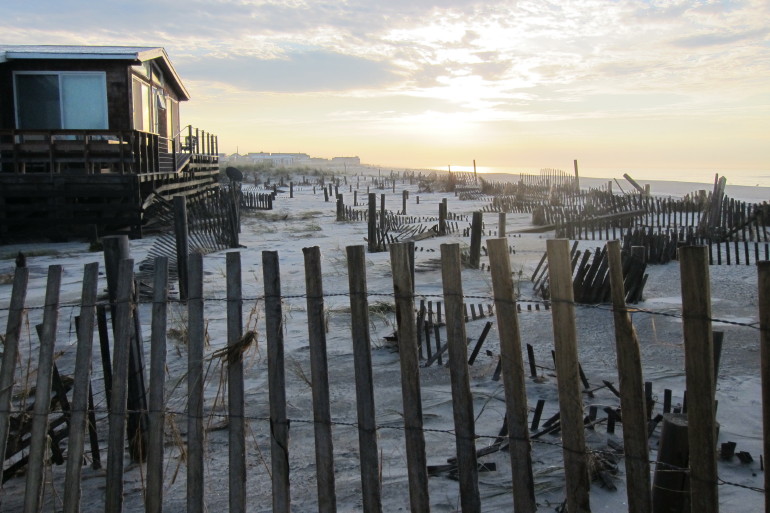August:
Harmony
1 September 2011
The morning is sunny and calm. Raindrops caught in the porch screens tell of a shower in the night, but the sky is clearer at the moment than it was yesterday. (We have had some very bright days since Irene. On Monday, it was as though the sun had just been invented and was being shown off to an admiring public.) Evidence of the storm is not striking, not at first. At first, you’re surprised and relieved that the houses, and the trees around them, look pretty much as they did before. For the most part, they look exactly the same. But when your eye drops to the ground, and you notice that you’re walking in sand, sand which has drifted everywhere, quite as if it were a new kind of snow, you notice the splintered bulkheads and fallen fences. You see that the slabs of pavement at the beach end of Sextant Walk have been heaved from the ground. And when you get to the beach, well, the beach is not the same. High tide reaches much further than it did before. That’s because the storm surge swept away the crest of sand that builds up at the shore in normal conditions. It swept the sand inland, onto the pavement and into drifts that are every bit as annoying as their wintry counterparts.
So now I have proof that the peace and quiet are deceptive. Of course I knew that peace and quiet don’t last forever, but now that I can see it, I’m strangely reassured. I don’t feel any better about getting old and infirm — where was the wave that could knock me down when I was twelve! — and I don’t feel any less anxious about the political and environmental future that threatens my grandson’s future. But I don’t feel like somebody who’s having a bad time at the beach. I’m having the right kind of time.
***
I chose the photograph above from the ones that I took this morning not because it was the nicest to look at but, on the contrary, because it accorded with the mood that reading Geoff Dyer’s The Missing of the Somme put me in. When the book was published in Britain in 1994, Dyer was all but unknown in the United States (although, as he points out, he was living in New Orleans during the Gulf War), and his meditation on the Great War and its R(r)emembrance would have been a hard sell. Now that Dyer is as fashionable as good writers ever get, it’s another story. Here’s a nugget from the closing pages:
There had been military disasters before the Battle of the Somme, but these — the Charge of the Light Brigade, for example — seerved only as indictments of individual strategy, not of the larger purpose of which they were a part. For the first time in history the Great War resulted in a sense of the utter waste and futility of war. If the twentieth century has drifted slowly toward an acute sense of waste as a moral and political issue, then the origins of the ecology of compassion (represented by the peace movement, most obviously) are to be found in the once-devastated landscape of the Somme.
Earlier, Dyer writes about searching, when reading about the War, “for what is not there, for what is missing.” Missing from The Missing of the Somme is an assessment of the purposeless of the Great War. This is taken for granted rather than explained. I found myself thinking about it on every page. How did something as hugely pointless — and as huge — as the Great War ever get going? As Dyer shows, commemoration of the “fallen” began almost at once, while men in all the belligerent countries were still enlisting with enthusiasm. We can explain the “origins” of the Great War in the usual geopolitical terms — the indisuputable first cause is the vacuum created by the collapse of the Ottoman Empire’s dominion of the Balkans — but doing so overlooks what was new about this War: the popular enthusiasm. Far from the “scum of the earth” conscripts that had made up so many armies in the past, it was enfranchised citizens, aflame with nationalist pride, who went to war in 1914. You couldn’t stop them from signing up, donning uniforms and heading for the front lines! Their enthusiasm ought to have given the monarchs pause; if it was jollier than the bloody-minded zeal of the French armies of the 1790s, it was not a whit less populist.
As Chou En-lai said of the French Revolution, it’s still too early to tell what the Great War was all about, but it seems clear that the political objectives that pushed the European powers to war were among the first casualties; that is why the War stopped making sense by the time the trenches were being dug. Had it not been for popular enthusiasm, kings and prime ministers could have called for retreat, but the genie was out of the bottle. The citizens who had gone off to war to crush the enemy for the sake of national honor became what the War was about. N

